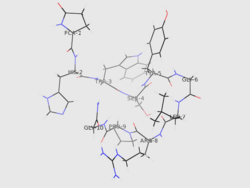Chemistry:Gonadotropin-releasing hormone analogue
| Gonadotropin-releasing hormone analogue | |
|---|---|
| Drug class | |
 GnRH, the peptide hormone from which all GnRH analogues are derived. | |
| Class identifiers | |
| Synonyms | GnRH blockers; GnRH inhibitors; Antigonadotropins |
| Use | Infertility; Prostate cancer; Precocious puberty; Breast cancer; Endometriosis; Uterine fibroids; Transgender people |
| Biological target | GnRH receptor |
| Chemical class | Peptides |
A gonadotropin-releasing hormone analogue (GnRH analogue or analog), also known as a luteinizing hormone releasing hormone agonist (LHRH agonist) or LHRH analogue is a synthetic peptide drug modeled after the human hypothalamic gonadotropin-releasing hormone (GnRH). A GnRH analogue is designed to interact with the GnRH receptor and modify the release of pituitary gonadotropins FSH and LH for therapeutic purposes. Shortly after the discovery of GnRH by Nobel laureates Guillemin and Schally researchers tried to modify the GnRH decapeptide with the intent to synthesize stimulating and blocking variants. Examples include goserelin and leuprorelin.[1]
An example of a GnRH modulator that is not a GnRH analogue is elagolix, a non-peptide and small-molecule compound.
Agonists
A gonadotropin-releasing hormone agonist (GnRH agonist) is an analogue that activates the GnRH receptor resulting in increased secretion of FSH and LH. Initially it was thought that agonists could be used as potent and prolonged stimulators of pituitary gonadotropin release, but it was soon recognized that agonists, after their initial stimulating action – termed a “flare” effect - eventually caused a paradoxical and sustained drop in gonadotropin secretion. This second effect was termed “downregulation” and can be observed after about 10 days. While this phase is reversible upon stopping the medication, it can be maintained when GnRH agonists use is continued for a long time.
Antagonists
A gonadotropin-releasing hormone antagonist (GnRH antagonist) is an analogue that blocks the GnRH receptor resulting in an immediate drop in gonadotropin (FSH, LH) secretion. The GnRH antagonist is primarily used in IVF treatments to block natural ovulation.
All GnRH analogues are contraindicated in pregnancy (pregnancy category X).
See also
- GnRH modulator
- Progonadotropin
- CYP17A1 inhibitor
References
- ↑ Speroff L, Glass RH, Kase NG. Clinical Gynecologic Endocrinology and Infertility. Fifth Edition. Willimas 7 Wilkins, Baltimore. 1994. Pages 160-161.
External links

